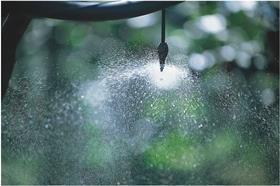
With Earth’s climate warming, water stress seems to move further north every year, as this summer’s unprecedented dry spell showed. After record low rainfall, water conservation has joined the list of challenges growers in the UK face. Now that climate scientists are predicting a rise in extreme weather events like this summer’s heatwave, irrigation advances are becoming increasingly vital.
With the government removing exemptions on water abstraction licenses this year, drip or trickle feed irrigation systems now require greater efficiency than ever. Irrigation companies like New Leaf are distributing higher tech systems to help growers stay within regulations and bolster water efficiency.
The Netafim Precision Irrigation System, designed in partnership with Berry Gardens, East Malling Research Station (NIAB-EMR), and Delta-T Devices, uses in-field sensors and data loggers to create a real-time view of the moisture levels in the soil. The targeted approach, currently designed for strawberry production, can cut your water use while boosting productivity. “You can increase your yield by up to 10 per cent,” says New Leaf’s Ben Grieveson.
In tandem with precision irrigation systems, wetting agents are also seeing a rise in demand. The simple yet effective process increases the soil’s liquid uptake by reducing the surface tension of water. Following one of Europe’s driest summers, Dave Steward, marketing manager for ICL, says: “People are now very interested, we have had people from Scandinavia enquiring. It’s a big talking point across the world and it’s critical in some parts.”
Wetting agents, which use surfactants to spread the water more evenly in the soil, preventing runoff, have been used in the turf and groundkeeping industry for a while, and are common on Premier League football grounds. The ICL Group’s H2Flow product helps decrease water input through greater efficiency. “We found that by reducing water usage by 25 per cent they could get the same yield,” Steward says. Unsurprisingly, California is their main market at the moment, which has been hit by severe water shortages in recent years.
Competitor John Ingle of Oro Agri says: “Water across the world is in increasingly short supply.” His company uses orange oil as a wetting agent, which can also help improve the efficiency of pesticides. “People didn’t move to water adjuvants when pesticides were cheap, as it doesn’t matter. But now the price of pesticides is really high and consequently they’re after anything that could help them become more efficient.”
Improving water quality also helps boost efficiency and sustainable practice, with water treatment company International Water Solucations (IWS) producing a treatment that rids water of pathogens.
IWS’ head of Agirculture Matthew Sillifant says sustainability and water efficiency “has been the focus of companies we are talking to”. One of the key gains he points to is from water treatment, simply by improving the water flow through pipes. “We have demonstrated success over the last few years that our product will clean pipes, improving efficiency and reducing use of agro-chemicals.”
The company’s product is certified as organic by the Soil Association. “If growers can halve their agro-chemical input, there’s a real advantage as we are reducing the chemicals going into the food chain.”
Water treatment also aids sustainability in another unexpected way, by improving shelf life. “The shelf life is extended when there’s no pathogens or diseases on the plants. We do a lot of work with growers on improving their shelf life, which decreases the amount of food being wasted.”



